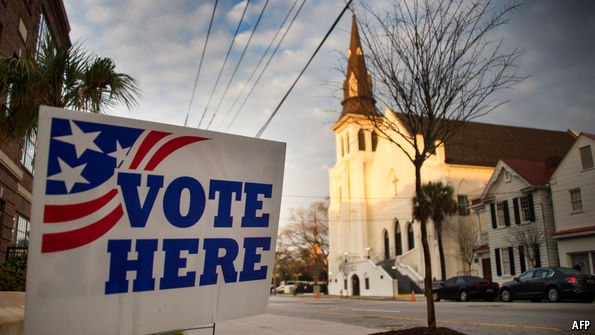
by Lee Ann M. Pomrenke
By all means, vote. It is urgently important that you vote. But that is not all.
People of faith don’t think we believe in magic. Yet we get tangled up in “magical thinking” all the time. We are especially conned into magical thinking when we express the urgency of a need so emphatically, that we start to believe one fix will actually solve everything.
“When people hear what that candidate did, surely their consciences would tell them how to vote.”
“We must get these people access to health care; lives will be saved!”
“If they would just get the baby baptized – get it done – I wouldn’t worry so much.”
The appeal of magical thinking is partially that our actions are promised to have immediate effect. We may need that sense of effectiveness to get us involved, to do uncomfortable things like speaking up or parting with our money. But change requires long-term repetition. Magical thinking lets us off the hook not only for our own actions, but our participation as instruments through whom God acts in the world, every day, one day at a time. Believing that one action or person will save us is magical thinking. Believing that one solution is the end to all problems (and effort) is magical thinking. Even prayer, treated as an end in itself, can revert to magical thinking if we do not let it change us – getting us involved for the long-term.
The common element in every situation we would like “fixed” once and for all is usually humanity. You can get sick or injured folks to a hospital, but medicine is still a very human endeavor, with plenty of room for error and even internal bias that can affect patient care. (Perhaps) you can get your candidate voted into office, but they enter a system that works a certain way, surrounded by advisers and special interest groups. Being voted into office is no guarantee they will work for us, unless we demand it. Baptism is a manifestation of God’s promise to claim us forever, yet it is but the beginning of the life of faith meant to be pursued in community. Instead of magical solutions, what we need most in the life of faith is endurance training.
One particular kind of magical thinking resembles a “savior complex.” Whether we are thinking about ourselves, our candidate, or a spiritual leader, believing or acting like this one person getting into a position of power is the end in itself, will always end in someone getting crucified (generally metaphorically). Magical thinking about leaders – without nuance – denies the human condition of being simultaneously saint and sinner. If we put all our faith in the new pastor to turn our congregation around, the doctor to heal diseases or new elected officials to fix society’s ills, our faith will continually be rocked and cracked. Humans become too impressed with ourselves; humans fail; humans sin. We need many people working together for the long-term. Those who think they can do anything lasting single-handed, will crash and burn.
Several years ago, my spouse and I went to a house party for a candidate for governor in our state. The candidate was a progressive Christian like us, friends with our friends, and his platform was based on single payer healthcare before that was something most people had even heard about. “Gosh, if we could elect this guy, we’d be set,” I thought. Do you know what his message was to us? “If I get into the Governor’s Office, your job is to keep me accountable. You have to make us – legislators, governors, whoever – do the right thing. Make me say, ‘X number of my constituents want _________.’ That’s your power.” He didn’t just want our vote; he needed our continuous advocacy even though he seemed to be “on our side.” Certainly, Election Day was (and IS) super important, but it is not the end.
Magical thinking (one fix and done) can excuse the need to keep trying. Have you heard it takes an average of 13 invitations for someone to come with you to church? Or 21 days to establish a new habit? One and done denies who we are, and what makes for behavior change in real people’s lives. Focusing on one point can also keep us from looking seriously for underlying causes of the current crisis we desperately need solved. “Solving” a problem without recognizing how we are abetting it in the first place keeps the cycle going! Are we putting too much hope in a political leader because we have abdicated our own responsibilities as citizens? Maybe we need a new leader for renewal of our congregation because the rest of us are stuck in patterns that discourage visitors from returning. If we rely on a “savior” instead of our collective actions to make the world better for ourselves and our neighbors, we will need a long line of saviors once the first one burns out or is disgraced.
Come Holy Spirit, come. The Holy Spirit is like wind blowing where it chooses, having an effect on those it encounters. We are buffeted by it, turned around in the right direction, and inspired to ACT so that God’s will may be done. Over and over and over again. There is nothing magical about the daily repetition of trudging uphill. But that is the constancy of God’s love, and that is what will change everything.
By all means, vote your conscience. Hire the right people or be the leader we all need. Inspire people to reach the fund-raising goal. But never let yourself believe it is – magically – the end of our call to action.
Lee Ann M. Pomrenke is a writer and Lutheran pastor in St. Paul, Minnesota

